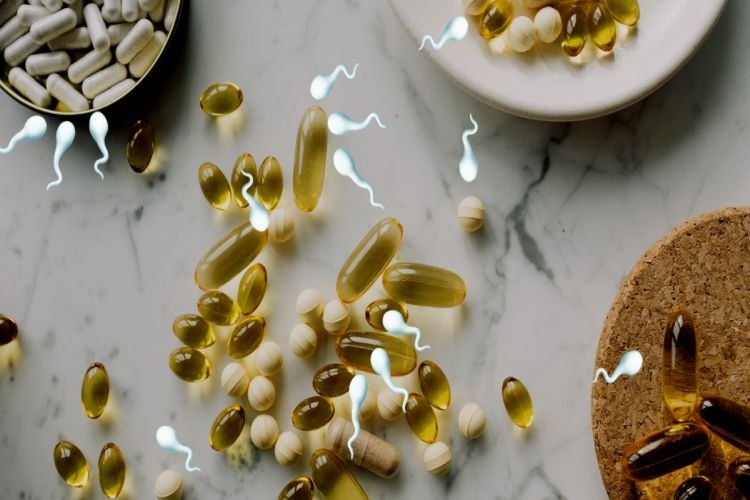 Men should take prenatal vitamins with folate and zinc to help increase sperm count and motility. This is especially important since folate deficiencies have been linked to chromosomal abnormalities in sperm.
Men should take prenatal vitamins with folate and zinc to help increase sperm count and motility. This is especially important since folate deficiencies have been linked to chromosomal abnormalities in sperm.
Nutrition matters for sperm health, supporting a healthy pregnancy and baby. High-quality men’s prenatal vitamins with key ingredients like CoQ10, Selenium, and Zinc will benefit your fertility.
Vitamin C
Vitamin C is an antioxidant that helps counter oxidative stress in semen, a key factor in sperm count, motility and quality. It’s recommended to get 90 milligrams a day of vitamin C from the diet or supplements.
Folate is also important for sperm health. Research shows that folate deficiency decreases sperm concentration and increases the number of sperm with DNA damage.
Look for the best men’s preconception vitamins with methylated folate, the form most easily absorbed by the body. Also, look for coenzyme Q10, a powerful antioxidant that reduces homocysteine levels, another common risk factor for fertility issues.
Folate
Folate is a water-soluble vitamin that naturally occurs in some foods. It’s also added to fortified foods and sold as a supplement. Folic acid is the lab-made form of folate and is better absorbed than the natural stuff.
As in women’s prenatal vitamins, folic acid is important for fertility and to prevent neural tube defects in babies. However, we prefer to recommend men take a vitamin that uses bioavailable 5-methyltetrahydrofolate instead of synthetic folic acid.
Similarly to the way that women’s prenatal vitamins work, men’s supplements should be taken starting three months before trying to conceive. This allows time for sperm to grow and improve in quality while decreasing oxidative stress in semen, which can reduce fertility outcomes.
Vitamin D
Thanks to decades of public health information campaigns, many women know that taking folate before conception is important for reducing the incidence of neural tube defects like spina bifida. But men need to think about preconception vitamins, too.
Male fertility vitamins typically contain key nutrients, including folic acid and antioxidants like vitamin C, E, selenium, zinc, and lycopene, to promote healthy sperm. It’s best to start these supplements three months before trying to conceive, as this is the amount of time it takes for sperm to mature.
It’s also worth choosing a third-party tested supplement made in a facility that follows current good manufacturing practices and is from a company that places importance on sustainability and transparency.
Vitamin B6
Men’s preconception vitamins are specially formulated to provide nutrients that support sperm count, motility, morphology and DNA. They also contain the antioxidant Glutathione (which helps to regulate cholesterol levels and reduce inflammation).
Several studies have shown that vitamin B6 decreases symptoms of PMS, including depression and irritability. This may be because it supports the production of neurotransmitters that control mood.
Experts suggest incorporating a men’s preconception vitamin into your routine at least three months before trying to conceive. This is because sperm need time to mature so they are ready to fertilize an egg. This will help to ensure a higher quality of sperm and reduce the risk of congenital disabilities.
Vitamin B12
A vitamin that boosts sperm motility, Vitamin B12 is crucial to healthy sperm production. Men with poor sperm motility have trouble fertilizing eggs and can experience infertility.
Also known as cobalamin, it helps make DNA and nerve cells. Vitamin B12 deficiency has been associated with depression, but supplementation can improve mood and increase energy.
Folate is well known for its critical role in pregnancy outcomes but can also benefit men. A daily multivitamin for men with folate and other nutrients that enhance sperm health (like lycopene and CoQ10) can support conception.
Biotin
Biotin, also called vitamin B7, is a water-soluble vitamin that aids in the metabolism of fat, carbohydrate, and protein. The body absorbs it via a saturable sodium-dependent multivitamin transporter shared with pantothenic and lipoic acid.
During pregnancy, urinary excretion of biotin and its metabolites increases. This may be a natural consequence of dilution from the increased blood volume in pregnancy or may indicate biotin deficiency (Mock & Heird 1997, Zempleni et al. 1997).
Many prenatal vitamins designed for women contain folic acid. Still, a properly designed men’s preconception supplement can offer key nutrients like methylated folate, Vitamin C, Vitamin D3, Vitamin B12, and other antioxidants such as Coenzyme Q10 and lycopene. These ingredients help optimize sperm health, support healthy conception and pregnancy outcomes, and long-term infant and maternal health.
Coenzyme Q10
Coenzyme Q10 (CoQ10) is a naturally occurring substance in the body that helps cells produce energy and acts as an antioxidant. It is found in most foods, especially organ meats, soy oil, sardines, mackerel, and peanuts.
Some anecdotal reports in the peer-reviewed scientific literature show that coenzyme Q10 can lengthen the survival of people with pancreatic, lung, colorectum and laryngeal cancers. Use our advanced clinical trial search to find NCI-supported cancer clinical trials that include coenzyme Q10.
Selenium
Several foods naturally contain the trace mineral selenium and are added to others and accessible as a nutritional supplement. It’s part of more than two dozen selenoproteins involved in thyroid hormone metabolism, DNA repair, and protection from oxidative damage and infection.
Food sources of selenium include Brazil nuts, meats, fish, and grains (the amount depends on the soil content where these foods grew). A deficiency is rare in the United States and Canada. Still, it can occur among people who follow vegan diets, live in areas with low soil selenium, or have chronic gastrointestinal issues like Crohn’s disease or celiac disease.
Zinc
Men’s preconception vitamins include zinc to help improve sperm development and health. A zinc deficiency has been linked to low sperm count, motility, and morphology. Zinc supplements also increase the antioxidant activity in semen, reducing oxidative stress that contributes to 30–80% of infertility cases (Fallah, 2018).
A trace mineral, zinc is found naturally in some foods, and added to many others. It is essential for over 100 enzymes that perform vital chemical reactions, including DNA synthesis, protein production, wound healing, immune function, taste and vision, and blood clotting.




